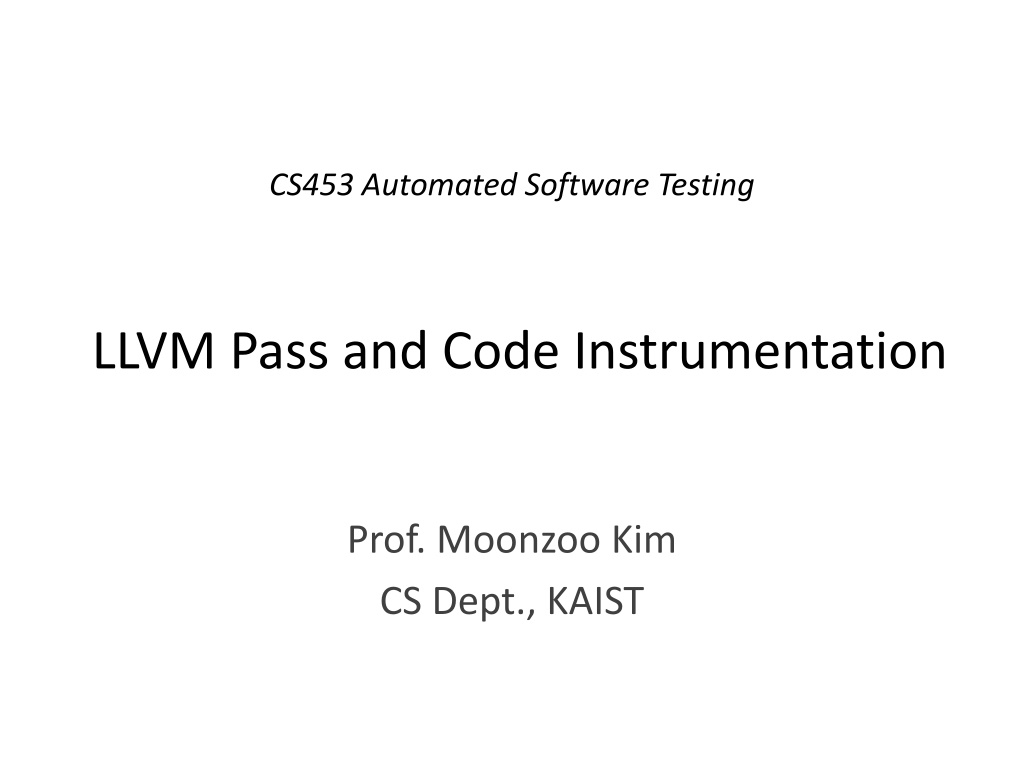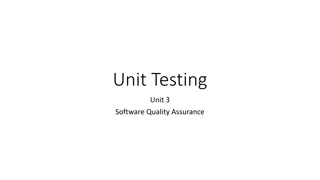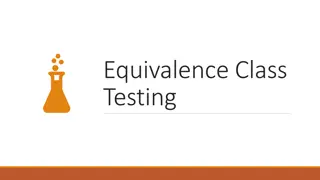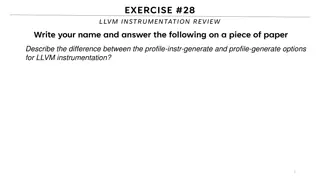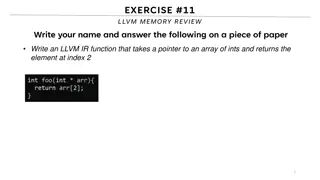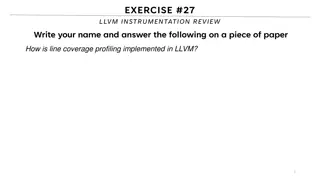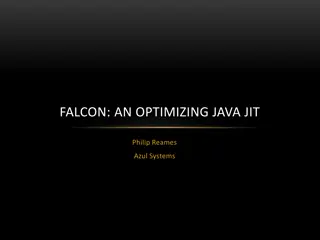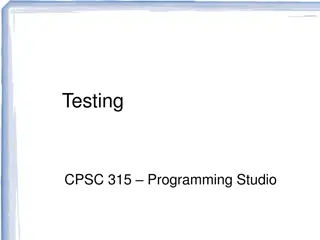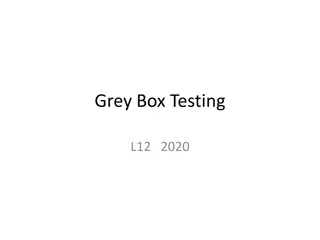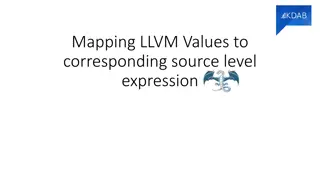Automated Software Testing with LLVM Pass and Code Instrumentation
This content delves into LLVM Passes, the LLVM Pass Framework, control flow graphs in LLVM IR, and an example Pass implementation called IntWrite for monitoring integer variable updates. It explains the process, concepts, and tools involved in automated software testing using LLVM Passes and code instrumentation techniques.
Download Presentation

Please find below an Image/Link to download the presentation.
The content on the website is provided AS IS for your information and personal use only. It may not be sold, licensed, or shared on other websites without obtaining consent from the author. Download presentation by click this link. If you encounter any issues during the download, it is possible that the publisher has removed the file from their server.
E N D
Presentation Transcript
CS453 Automated Software Testing LLVM Pass and Code Instrumentation Prof. Moonzoo Kim CS Dept., KAIST 2024-10-04 / 17
Pass in LLVM A Pass receives an LLVM IR and performs analyses and/or transformations. Using opt, it is possible to run each Pass. A Pass can be executed in a middle of compiling process from source code to binary code. The pipeline of Passes is arranged by Pass Manager Clang Opt C/C++ front end Source code Executable code IR Pass1 IR1 Passn IRn llc 2024-10-04 2 / 17 LLVM Pass and Code Instrumentation
LLVM Pass Framework The LLVM Pass Framework is the library to manipulate an AST of LLVM IR (http://llvm.org/doxygen/index.html) An LLVM Pass is an implementation of a subclass of the Pass class Each Pass is defined as visitor on a certain type of LLVM AST nodes There are six subclasses of Pass ModulePass: visit each module (file) CallGraphSCCPass: visit each set of functions with caller-call relations in a module (useful to draw a call graph) FunctionPass: visit each function in a module LoopPass: visit each set of basic blocks of a loop in each function RegionPass: visit the basic blocks not in any loop in each function BasicBlockPass: visit each basic block in each function 2024-10-04 3 / 17 LLVM Pass and Code Instrumentation
Control Flow Graph (CFG) at LLVM IR 1 entry: 2 3 %0 = load i32* %x 4 %c = icmp sgt i32 %0 0 5 br i1 %c, label %c.t, %c.f 6 c.t: 7 %1 = load i32* %x 8 br label %c.end 9 c.f: 10 br label %c.end 11 c.end: 12 %cond = phi i32 [%1,%c.t],[0,%c.f] 13 store i32 %cond, i32* %y 14 return i32 %cond int f() { int y; y = (x > 0) ? x : 0 ; return y; } CFG entry: 2 3 %0= 4 %c= 5 br i1 %c terminator c.t: 7 %1=load i32* 8 br label %c.end c.f: 10 br label %c.end terminator terminator c.end: 12 %cond=phi 13 store 14 return 2024-10-04 4 / 17 terminator
Example Pass Let s create IntWrite that aim to monitor all history of 32-bit integer variable updates (definitions) Implemented as a FunctionPass Produces a text file where it record which variable is defined as which value at which code location. IntWrite instruments a target program to insert a probe before every integer writing operation, which extracts runtime information _probe_(10, y , x); 10 y = x ; _probe_(11, z , y+x); 11 z = y + x ; void _probe_(int l,char *,int v){ fprintf(fp, %d %s %d\n , );} 10 y = x ; 11 z = y + x ; 2024-10-04 5 / 17 LLVM Pass and Code Instrumentation
Module Class A Module instance stores all information related to the LLVM IR created by a target program file (functions, global variables, etc.) APIs (public methods) getModuleIdentifier(): return the name of the module getFunction(StringRef Name): return the Function instance whose identifier is Name in the module getOrInsertFunction(StringRef Name, Type *ReturnType, ): add a new Function instance whose identifier is Name to the module getGlobalVariable(StringRef Name): return the GlobalVariable instance whose identifier is Name in the module 2024-10-04 6 / 17 LLVM Pass and Code Instrumentation
Type Class A Type instance is used for representing the data type of registers, variables, and function arguments. Static members Type::getVoidTy( ): void type Type::getInt8Ty( ): 8-bit unsigned integer (char) type Type::getInt32Ty( ): 32-bit unsigned integer type Type::getInt8PtrTy( ): 8-bit pointer type Type::getDoubleTy( ): 64-bit IEEE floating pointer type 2024-10-04 7 / 17 LLVM Pass and Code Instrumentation
FunctionPass Class (1/2) FunctionPass::doInitialization(Module &) Executed once for a module (file) before any visitor method execution Do necessary initializations, and modify the given Module instances (e.g., add a new function declaration) FunctionPass::doFinalization(Module &) Executed once for a module (file) before after all visitor method executions Export the information obtained from the analysis or the transformation, any wrap-up 2024-10-04 8 / 17 LLVM Pass and Code Instrumentation
Example IntWrite should inserts a new function _init_ at the beginning of the target program s main function _init_() is to open an output file 01 virtual bool doInitialization(Module & M) { 02 if(M.getFunction(StartingRef( _init_ ))!=NULL){ 03 errs() << _init_() already exists. ; 04 exit(1) ; 05 } check if _init_() already exists 06 FunctionType *fty = FunctionType::get(Type::getVoidTy(M.getContext()),false) ; 07 fp_init_ = M.getOrInsertFunction( _init_ , fty) ; add a new declaration _init_() ... 08 return true ; 09 } 2024-10-04 9 / 17 LLVM Pass and Code Instrumentation
FunctionPass Class (2/2) runOnFunction(Function &) Executed once for every function defined in the module The execution order in different functions is not possible to control. Read and modify the target function definition Function Class getFunctionType(): returns the FunctionType instance that contains the information on the types of function arguments. getEntryBlock(): returns the BasicBlock instance of the entry basic block. begin(): the head of the BasicBlock iterator end(): the end of the BasicBlock iterator 2024-10-04 10 / 17 LLVM Pass and Code Instrumentation
Example 01 virtual bool runOnFunction(Function &F) { 02 cout << Analyzing << F->getName() << \n ; 03 for (Function::iterator i = F.begin(); i != F.end(); i++){ 04 runOnBasicBlock(*i) ; 05 } 06 return true;//You should return true if F was modified. False otherwise. 07 } 2024-10-04 11 / 17 LLVM Pass and Code Instrumentation
BasicBlock Class A BasicBlock instance contains a list of instructions APIs begin(): return the iterator of the beginning of the basic block end(): return the iterator of the end of the basic block getFirstInsertionPt(): return the first iterator (i.e., the first instruction location) where a new instruction can be added safely (i.e., after phi instruction and debug intrinsic) getTerminator(): return the terminator instruction splitBasicBlock(iterator I, ): split the basic block into two at the instruction of I. 2024-10-04 12 / 17 LLVM Pass and Code Instrumentation
Instruction Class An Instructioninstance contains the information of an LLVM IR instruction. Each type of instruction has a subclass of Instruction (e.g. LoadInst, BranchInst) APIs getOpcode(): returns the opcode which indicates the instruction type getOperand(unsigned i): return the i-th operand getDebugLoc(): obtain the debugging data that contains the information on the corresponding code location isTerminator(), isBinaryOp() , isCast(), . 2024-10-04 13 / 17 LLVM Pass and Code Instrumentation
Example bool runOnBasicBlock(BasicBlock &B) { for(BasicBlock::iterator i = B.begin(); i != B.end(); i++){ if(i->getOpcode() == Instruction::Store && i->getOperand(0)->getType() == Type::getInt32Ty(ctx)){ StoreInst * st = dyn_cast<StoreInst>(i); int loc = st->getDebugLoc().getLine(); //code location Value * var = st->getPointerOperand(); //variable Value * val = st->getOperand(0); // target register /* insert a function call */ } } return true ; } 01 02 03 04 05 06 07 08 09 10 11 12 13 2024-10-04 14 / 17 LLVM Pass and Code Instrumentation
How to Insert New Instructions IBBuilder class provides a uniform API for inserting instructions to a basic block. IRBuilder(Instruction *p): create an IRBuilder instance that can insert instructions right before Instruction *p APIs CreateAdd(Value *LHS, Value *RHS, ): create an add instruction whose operands are LHS and RHS at the predefined location, and then returns the Value instance of the target operand CreateCall(Value *Callee, Value *Arg, ): add a new call instruction to function Callee with the argument as Arg CreateSub(), CreateMul(), CreateAnd(), 2024-10-04 15 / 17 LLVM Pass and Code Instrumentation
Value Class A Value is a super class of all entities in LLVM IR such as a constant, a register, a variable, and a function. The register defined by an Instruction is represented as a Value instance. APIs getType(): returns the Type instance of a Value instance. getName(): return the name from the source code. 2024-10-04 16 / 17 LLVM Pass and Code Instrumentation
Example 00 if(i->getOpcode() == Instruction::Store && 01 i->getOperand(0)->getType() == Type::getInt32Ty(ctx) { 02 StoreInst * st = dyn_cast<StoreInst>(i); 03 int loc = st->getDebugLoc().getLine(); //code location 04 Value * var = st->getPointerOperand(); //variable 05 Value * val = st->getOperand(0); // target register 06 IRBuilder<> builder(i) ; 07 Value * args[3] ; 08 args[0] = ConstantInt::get(intTy, loc, false) ; 09 args[1] = builder.CreateGlobalStringPtr(var->getName(),""); 10 args[2] = val ; 11 builder.CreateCall(p_probe, args, Twine("")) ; 12 } 2024-10-04 17 / 17 LLVM Pass and Code Instrumentation
More Information Writing an LLVM Pass http:// llvm.org/docs/WritingAnLLVMPass.html LLVM API Documentation http://llvm.org/doxygen/ How to Build and Run an LLVM Pass for Homework#4 http://swtv.kaist.ac.kr/courses/s453-14fall/hw4-manual.pdf 2024-10-04 18 / 17 LLVM Pass and Code Instrumentation
